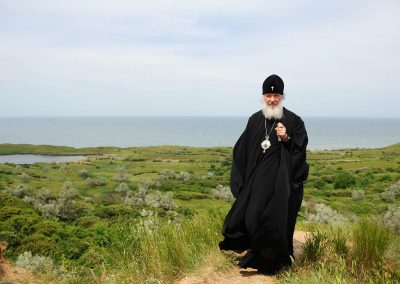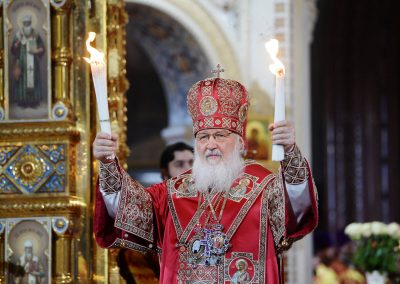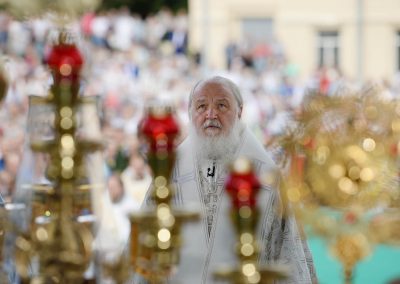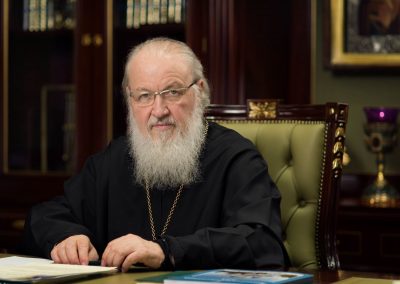PATRIARCH OF THE RUSSIAN ORTHODOX CHURCH
Biography. Sermons. News. Official Documents"The most important part of the mission of the Church has remained unchanged since the time of the apostles - to bear witness to our resurrected Lord and Savior Jesus Christ, to the eternal and unchanging moral law that God has placed in the hearts of mankind."
- HIS HOLINESS PATRIARCH KIRILL
BIOGRAPHY
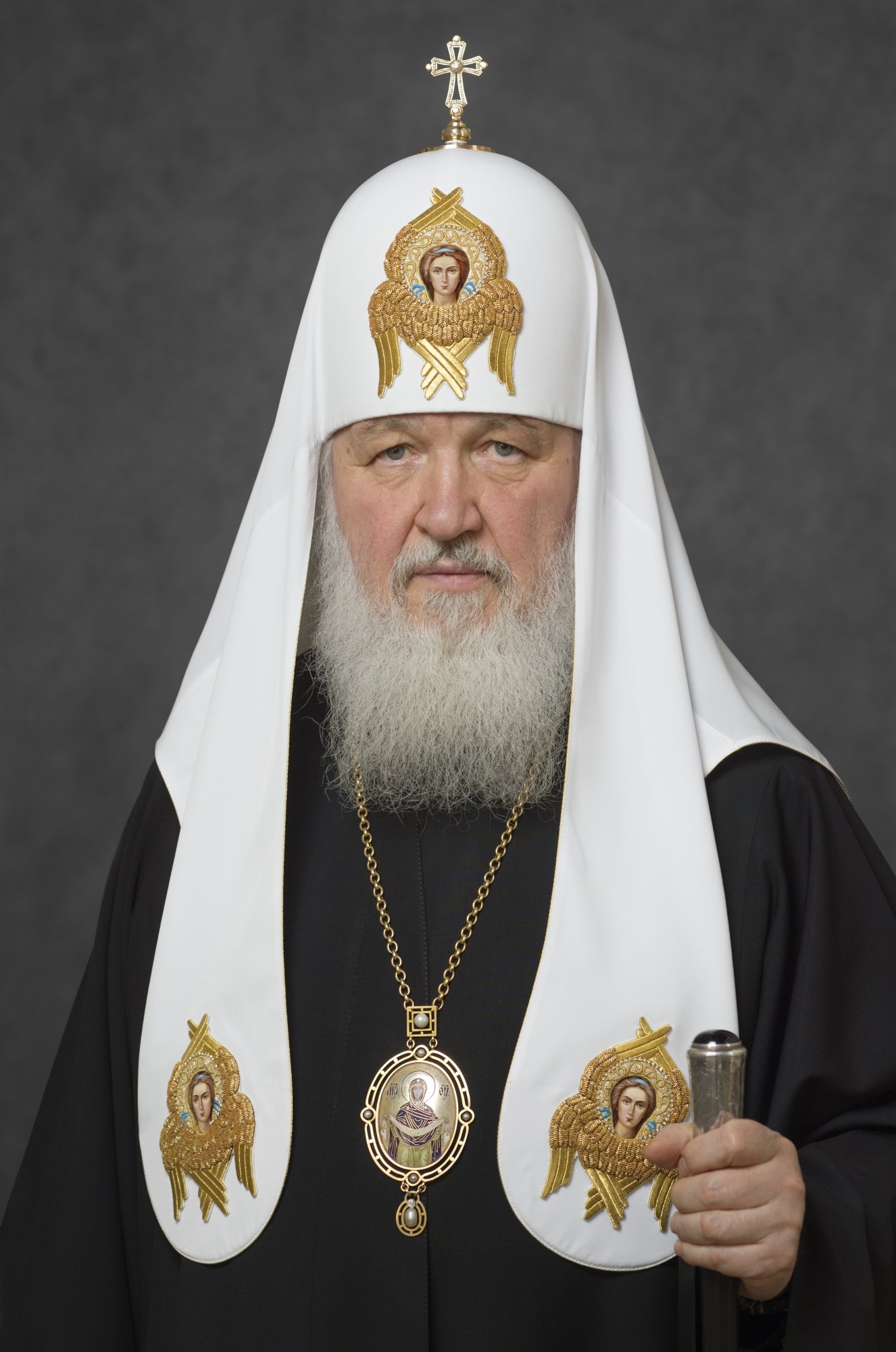
His Holiness Patriarch Kirill of Moscow and All Russia
His Holiness Patriarch Kirill of Moscow and All Russia (secular name - Vladimir Mikhailovich Gundyaev) was born on November 20, 1946 in the city of Leningrad (Saint Petersburg). His father, Mikhail Vasilievich, was a priest, his mother, Raisa Vladimirovna, was a school teacher who taught German. His grandfather, Priest Vasily Stepanovich Gundyaev, was imprisoned and exiled for church activities and the struggle against renovationism in the 1920s and 1940s, and was a prisoner of Solovki.
After graduating from high school in 1965, Vladimir Gundyaev entered the Leningrad Theological Seminary, and then the Leningrad Theological Academy, which he graduated with honors in 1970. The future Patriarch was tonsured into monasticism on April 3, 1969 by the Metropolitan of Leningrad and Novgorod Nikodim (Rotov) with the name Kirill. On April 7 of the same year, he was ordained a hierodeacon, and on June 1 - a hieromonk.
Later, from 1970 to 1971, Hieromonk Kirill taught dogmatic theology at the Leningrad Theological Academy, was an assistant to the inspector of the Leningrad Theological Schools, and at the same time was the personal secretary of Metropolitan Nikodim (Rotov).
In September 1971, Hieromonk Kirill was elevated to the rank of archimandrite, and for the next four years was the representative of the Moscow Patriarchate at the World Council of Churches in Geneva. At the age of 29, on March 14, 1976, Archimandrite Kirill was consecrated bishop of Vyborg, and on September 2, 1977 he was elevated to the rank of archbishop.
For ten years, Bishop Kirill was rector of the Leningrad Theological Academy and Seminary, and in December 1984 he was appointed Archbishop of Smolensk and Vyazemsky.
Since 1986, Archimandrite Kirill was the administrator of parishes in the Kaliningrad region, and in 1988 he became archbishop of Smolensk and Kaliningrad. The future Patriarch headed the Smolensk diocese for 25 years. Under his leadership, the surrounding Kaliningrad region was included into the diocese, where practically form the ground up, the first orthodox churches began to appear and Orthodoxy continued to spread. As a result, a seminary was opened in Smolensk, Orthodox grammar schools appeared in the diocese, and 165 new parishes were opened.
On February 25, 1991, Archbishop Kirill was elevated to the rank of Metropolitan. Along with the administration of the Smolensk diocese, Metropolitan Kirill served the Church as an diplomat of the Church and a theologian.
He regularly delivered lectures, including in Western universities, participated in inter-Christian dialogue, and repeatedly met with leaders of other Christian confessions and with leaders of foreign states.
From November 1989 to 2009, he was Chairman of the Department for External Church Relations and a permanent member of the Holy Synod.
As the head of the Department for External Church Relations, Metropolitan Kirill took an active part in the reunification of the two branches of the Russian Church. He also led the preparation of two important documents that determined the position of the Church regarding the most important social and political challenges of the 21st century - "Fundamentals of the Social Concept of the Russian Orthodox Church" and "Fundamentals of the Teaching of the Russian Orthodox Church on Human Dignity, Freedom and Rights."
In the course of his ministry, Metropolitan Kirill took an active part in peacekeeping actions in the former Yugoslavia. During the war, he repeatedly visited Belgrade, negotiated with the leadership of Serbia, initiated the creation of an informal international Christian peacekeeping group for Yugoslavia in May 1999.
Since 1994, Metropolitan Kirill has been the author and host of the weekly television show The Word of the Shepherd on Channel One in Russia.
As chairman of the Commission of the Holy Synod for the revival of religious and moral education and charity, he initiated the creation of Synodal departments for religious education, social service and charity, and for cooperation with the armed forces and law enforcement agencies. He was the author of the Concept for the revival of charity and religious education, adopted by the Holy Synod on January 30, 1991. In 1994 he developed and submitted the Concept of Interaction between the Russian Orthodox Church and the Armed Forces for approval to the Holy Synod.
After the death of His Holiness, Patriarch Alexy II, on December 6, 2008, Metropolitan Kirill of Smolensk and Kaliningrad, out of seven permanent members of the Holy Synod, was elected locum tenens of the Patriarchal throne.
On January 27, 2009, the Local Council of the Russian Orthodox Church, by secret ballot, elected Metropolitan Kirill as Patriarch of Moscow and All Russia.
His Holiness Patriarch Kirill is a doctor of theology, an honorary professor at a number of religious and secular universities in Russia and in the West, the author of several books and more than 700 publications on various issues of church life. He holds high ranking state awards, as well as awards of the Russian Orthodox Church and awards from many Local Orthodox Churches.
LATEST NEWS FROM THE OFFICIAL WEBSITE OF THE MOSCOW PATRIARCHATE
Patriarchal Ministry:
- Поздравление Святейшего Патриарха Кирилла генеральному директору информационного агентства «Россия сегодня» Д.К. Киселеву с 70-летием со дня рождения
- Патриаршее соболезнование в связи с кончиной клирика Московской (городской) епархии протоиерея Василия Скоробогатова
- Патриаршее поздравление митрополиту Тульчинскому Ионафану с 35-летием архиерейской хиротонии
- Приветствие Святейшего Патриарха Кирилла участникам конференции «Партнерство государства и общества в деле гармоничного воспитания ответственной личности на основе традиционных российских духовно-нравственных ценностей»
- Патриаршее поздравление митрополиту Челябинскому Алексию с 50-летием со дня рождения
- Патриаршее поздравление епископу Раменскому Алексию с 15-летием работы в Московской Патриархии
- Издательство Московской Патриархии начинает выпуск новой серии «Монашеская библиотека»
- Приветствие Святейшего Патриарха Кирилла участникам торжеств, посвященных десятилетию Объединения многодетных семей г. Москвы
- Патриаршее поздравление митрополиту Лазарю (Швецу) с 85-летием со дня рождения
- Святейший Патриарх Кирилл совершил освящение столичного храма Чуда Архангела Михаила в Хонех в Братееве
- Патриаршая проповедь в Неделю 5-ю Великого поста после Литургии в храме Чуда Архангела Михаила в Хонех в Братееве г. Москвы
- Святейший Патриарх Кирилл совершил освящение столичного храма Чуда Архангела Михаила в Хонех в Братееве и возглавил хиротонию архимандрита Авксентия (Абражея) во епископа Несвижского
- Слово Святейшего Патриарха Кирилла при вручении архиерейского жезла Преосвященному Авксентию (Абражею), епископу Несвижскому, викарию Патриаршего экзарха всея Беларуси
- Патриаршее поздравление митрополиту Костромскому Ферапонту с 55-летием со дня рождения
- Святейший Патриарх Кирилл совершил утреню с чтением акафиста Пресвятой Богородице в Храме Христа Спасителя
Latest Videos from Patriarchia.ru :
- Святейший Патриарх Кирилл совершил освящение столичного храма Чуда Архангела Михаила в Хонех в Братееве
- Святейший Патриарх Кирилл совершил утреню с чтением акафиста Пресвятой Богородице в Храме Христа Спасителя
- Предстоятель Русской Церкви вручил руководителю Патриаршей службы протокола протоиерею Андрею Бондаренко медаль равноапостольного князя Владимира
- Святейший Патриарх Кирилл совершил утреню с чтением Великого канона преподобного Андрея Критского в Храме Христа Спасителя
- Святейший Патриарх Кирилл совершил освящение Казанского храма в Лосиноостровской г. Москвы
- Святейший Патриарх Кирилл возглавил заседание Организационного комитета празднования 100-летия со дня кончины святителя Тихона, Патриарха Московского
- Святейший Патриарх Кирилл совершил молебен у раки с мощами святителя Тихона в Донском монастыре
- В праздник Благовещения Пресвятой Богородицы Святейший Патриарх Кирилл совершил Божественную литургию в Благовещенском соборе Московского Кремля
- В канун праздника Благовещения Пресвятой Богородицы Святейший Патриарх Кирилл совершил всенощное бдение в Храме Христа Спасителя
- Святейший Патриарх Кирилл встретился с губернатором Тверской области И.М. Руденей и митрополитом Тверским и Кашинским Амвросием
- Святейший Патриарх Кирилл посетил выставку современного церковного искусства и архитектуры при храме равноапостольного князя Владимира в Тушине
- Святейший Патриарх Кирилл совершил освящение Владимирского храма в Тушине
- Выступление Святейшего Патриарха Кирилла на внеочередном съезде Всемирного русского народного собора
- В Неделю Торжества Православия Святейший Патриарх Кирилл совершил Литургию в Храме Христа Спасителя
- Святейший Патриарх Кирилл совершил заупокойную литию по погибшим в результате террористического акта в концертном зале «Крокус Сити Холл»

